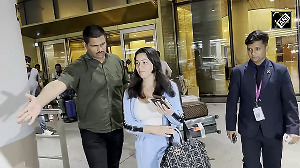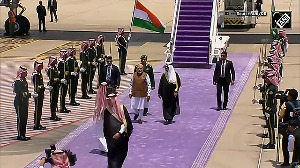Paying her tribute to Ustad Bismillah Khan, Supreme Court lawyer and music lover Indira Jaising says music was the only religion that the maestro knew.
A few months ago, I was at a concert in Mumbai at the Nehru Center. What attracted me to the concert was the fact that Ustad Bismillah Khan was to perform there that night.
Undoubtedly, his music was divine, but Bismillah Khan, the person, was indeed more than his music. He spoke at the performance and whatever he said that night has lingered longer in my mind than his music.
After he finished his performance, he was given a standing ovation -- nothing new in his case -- and asked to play again. It is then that he spoke - about himself and his music.
He said, unlike other performers who play string instruments, he used his lungs to play the shehnai and hence the request was unreasonable. There was a limit to his lung's capacity, the maestro said.
To listen to a master of the art talk about his frailty was a humbling experience. His lung capacity may have been limited, but there was no limit to his love for music. With a broad smile on his face, he said, "Sangeet hi mera mazab hai, sangeet hi mere jan hai, sangeet hi mari zindigi hai." Music, he said, was his only religion.
He was speaking in the context of a communal polity and wished to make the point that, for him, there was no other religion but music. His words overshadowed his music.
As a recent recruit to the study of Indian vocal music, I came away with the feeling that music was ageless and timeless and that each one of us, if we choose, can say that music is our true religion.
Yet I did not quite understand the full import of what he said until, yesterday, when I saw him too ill to even eat and drink, but not sick enough to sing. It is then that I understood the full import of the statement at the Nehru Centre.
For him, singing and music were more natural than breathing. More than his music, his words, Sangeet hi mera mazab hai, will remain with me forever.







 © 2025
© 2025